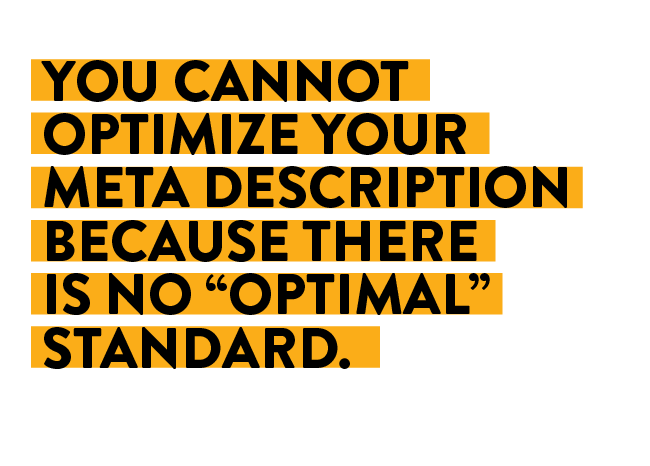 That’s right — there is no actual, universal standard for optimizing meta descriptions for search. Partly that is because meta descriptions are viewed so differently by different devices, platforms, and even readers. Partly, that’s because meta descriptions do not influence rankings — not at a core, algorithmic level, and not as a tie-breaker for competitive queries.
That’s right — there is no actual, universal standard for optimizing meta descriptions for search. Partly that is because meta descriptions are viewed so differently by different devices, platforms, and even readers. Partly, that’s because meta descriptions do not influence rankings — not at a core, algorithmic level, and not as a tie-breaker for competitive queries.
While seeing a meta description could theoretically influence a searcher’s impression of a page, you may want to reconsider whether your best use of this fleeting attention is to craft a meta description around a call to action (CTA) screaming at users to engage with your content.
Meta Descriptions Look Different in Every SERP
You cannot optimize an element that will look so wildly different depending on so many distinct factors. And the obvious truth of the situation is, different searchers using different devices will have their SERPs look pretty different. Desktop SERPs may display as many as 300 characters, while mobile screens will generally terminate around 160 — hence one school of thought that says to make all meta descriptions just 160 characters across the board.
But the variations don’t end here — meta displays may also be influenced by other SERP features. A carousel, a map indicating local results, or the full litany of video, image, social, and news results (along with People Also Asked suggestions and knowledge panels) can all disrupt the structure and appearance of the SERP, and inform how much visual real estate the SERP gives over to snippets.
If you want to zealously study the exact SERP construction for every page and every keyword you target with your content, and custom tailor your meta descriptions to all these potential displays and variables, more power to you, but while you tear your hair out over finding the skeleton key for accomplishing this fine-tuning at scale, someone who cares more about creating quality content than incrementally hacking the system will bury your optimized meta descriptions in the SERP.
Google May Never Display Your Meta Description
 But there’s more: even if you take the time to craft the most descriptive, compelling meta in 160 characters or less, Google may not even show it to searchers. More than half the time (62.78% of the time, according to the Ahrefs study linked above), Google will use its indexed memory of a page to automatically generate its own original meta description, usually to better match a searcher’s exact query and highlight occurrence of keywords in the actual page, as opposed to the description you wrote for the page.
But there’s more: even if you take the time to craft the most descriptive, compelling meta in 160 characters or less, Google may not even show it to searchers. More than half the time (62.78% of the time, according to the Ahrefs study linked above), Google will use its indexed memory of a page to automatically generate its own original meta description, usually to better match a searcher’s exact query and highlight occurrence of keywords in the actual page, as opposed to the description you wrote for the page.
Meta Descriptions Are Not a Google Ranking Factor
Lest we forget, it is worth reiterating that regardless of whether Google displays what you wrote or not, meta descriptions are not a ranking factor. Your use of keywords, calls to action, or other clever on-page optimization techniques in the meta description are not going to change Google’s interpretation or algorithmic assessment of the value of your page. In fact, according to that same Ahrefs review, more than a quarter of the top-ranking results across the web have no meta description at all.
This little statistic speaks volumes, especially if you acknowledge that the meta description isn’t a ranking factor per se, but still recognize their potential to influence searcher behavior, and insist on ending every meta with a cheerful, imperative CTA. Leaving aside how CTAs are nowhere in Google’s webmaster guidelines or any other medium for optimizing meta descriptions, consider whether Google itself is likely to automatically generate a CTA for a meta description — or if it will simply summarize the content on the page, indicate its relevance to a query, and leave it to searchers to choose what they click on.
Google knows, as any competent SEO knows, that what influences searcher behavior most is finding what they are looking for in a SERP. That generally translates to relevance, and content quality — neither of which requires a CTA to compel searchers to recognize the connection. Cramming a CTA into your meta description might warm the cockles of your marketer’s heart, but in practice, it is a poor use of the tag and a gross misunderstanding of SEO.
All this seems to point to meta descriptions being, at worst, a waste of your valuable time and marketing energy, and at best, perhaps equal to a coin-flip chance of impacting the human experience of your page in the SERP.
So Why Worry About Meta Descriptions at All?
If you can modify or customize an on-page element — especially one that has a chance of forming searchers’ first impressions of your page — why wouldn’t you take advantage? Even if it is not going to impact rankings, a page’s keyword profile, or display uniformly across all screens and devices, we know that the meta description is, and long has been, part of the holy trinity of the standard SERP: title tag, URL, and description.
 It may be counterintuitive to the point of making you question everything you ever believed to recognize that, of this holy trinity, only one (the almighty title tag) is actually a ranking factor for Google search. Keyword-stuffing your page paths, domain names, and other URL features doesn’t meaningfully influence how pages or sites are crawled. According to Google, at best it gives the bots a one-time, initial impression of what your site might be about, which is immediately rendered irrelevant by a full crawl of the actual content on the page and across the domain.
It may be counterintuitive to the point of making you question everything you ever believed to recognize that, of this holy trinity, only one (the almighty title tag) is actually a ranking factor for Google search. Keyword-stuffing your page paths, domain names, and other URL features doesn’t meaningfully influence how pages or sites are crawled. According to Google, at best it gives the bots a one-time, initial impression of what your site might be about, which is immediately rendered irrelevant by a full crawl of the actual content on the page and across the domain.
Likewise, meta descriptions are crawled and casually ignored by the world’s biggest search engine. But, before dismissing meta descriptions entirely as irrelevant, it is worth remembering that Google is not everything to everyone.
Ranking Factors for Other Web Search Engines
Psych. Bing and Yahoo also don’t really use meta descriptions, or keywords featured therein, as an active ranking factor for their respective algorithms either. Bing’s webmaster guidelines look remarkably similar to Google’s when it comes to meta description optimization: be unique, be relevant, but don’t worry, the search engine can always just invent one from the page itself automatically. Stuffing keywords into the meta for the benefit of non-Google search engines may be seen as a spam signal, rather than a loophole for boosting your rankings.
That doesn’t mean meta descriptions will never become a ranking factor. If meta descriptions are valuable enough to feature in the SERP — as they do on virtually every search engine — and rate their own meta tag in the HTML so bots can recognize and index them as a unique page element, why shouldn’t they figure into the algorithm that parses the index to populate results?
Your best bet is to think of meta descriptions the same way as title tags: they need to be unique to the page, they need to accurately and succinctly describe the contents of the page, and in doing so they should naturally match the keywords featured on the page. That doesn’t mean they should be stuffed with keywords — they shouldn’t — and that doesn’t mean they need to contain an exact-match of your most important keyword target — they don’t.
All it means is that a searcher (or bot) reading your meta description, should not be surprised, confused, or disappointed by what they see when they read the actual page described.
Social Media Posts and Sharing Links
While many social platforms give you the option of drafting an original description, snippet, or preview unique to each platform, the historic default has been to just display whatever is tagged in the meta description. While this doesn’t directly influence search performance in any way, depending on your use of social platforms and marketing priorities, this may warrant some extra consideration.
If you are actively or aggressively leveraging social channels, then it is probably worth your time to learn how each platform you use manages descriptions. The medium also matters: Facebook’s system for sharing or promoting content looks pretty distinct from Instagram or TikTok, and they all emphasize different elements (text, images, video).
What this means is simple: meta descriptions are probably worth including on every page, if only to give you the potential to manage one more layer of interaction users may have on a variety of platforms, from search to social, and possibly elsewhere. However, this only adds more variation into the mix, which further emphasizes the point that, while they might matter some of the time, meta descriptions cannot be optimized for lack of any unifying standard of how they look or are used.
How To Write Meta Descriptions
 Google itself has provided a very concise set of general guidelines for drafting snippets or meta descriptions for pages. You’ll notice that these are all pretty broad — no mention of character or pixel-based display limitations, worrying about desktop vs mobile, or even, remarkably for Google, a warning against using some form of automation to generate this element at scale.
Google itself has provided a very concise set of general guidelines for drafting snippets or meta descriptions for pages. You’ll notice that these are all pretty broad — no mention of character or pixel-based display limitations, worrying about desktop vs mobile, or even, remarkably for Google, a warning against using some form of automation to generate this element at scale.
Google’s guidelines for meta descriptions are:
- Give every page a meta description — that is, don’t skip this step, and do actually craft metas;
- Make every page’s meta description unique — don’t copy + paste the same thing on every page;
- Make meta descriptions relevant to the page — in other words, make sure the description does describe the page, in simple, descriptive terms.
- Automate meta descriptions using page data — or do what Google does for your own pages: scrape the content and use that to ensure that all metas are unique and, by virtue of coming from the page itself, unique to the page. This point is optional, depending on the nature of your site and your resources.
If you follow that link above, you’ll see Google’s list includes five points rather than my four. That’s because Google, as always, emphasizes quality in their guidelines, and distinguishes “relevant” from “high quality”. This kind of repetition when it comes to “quality” is classic Google, but if you aren’t writing something relevant to a page you are trying to optimize, then what does quality even mean?
Focus on What Matters, Not How You Feel
In the absence of fact, SEO is rife with speculation and passionate opinions. Meta descriptions, under their emphasis and visibility in the SERP, have won a popular perception of being more important than other on-page factors or SEO best practices. It makes intuitive sense to worry about the text that might appear, alongside the page URL and title tag, in the SERP itself, but that mistakes what the SERP appears to be for what happens behind the scenes.
We know for a fact that earning links to your site matters; by extension, having content that is worth linking to is essential for any SEO campaign. Crafting quality, search-optimized content runs into more nuance and subjectivity, but we still have a decent idea of what Google means, and is looking for, when it comes to “quality” in content: namely, content that satisfies searcher intent.
Going From Good to Great SEO Doesn’t Happen With Meta Descriptions
Good SEO is a matter of attention to detail and active consideration of both the human user experience, and the automated crawler bots used by search engines. But great SEO makes leaner use of resources, and focuses on what matters most, what influences the algorithm and what human searchers will see, notice, and care about. Great SEO, in other words, isn’t preoccupied with fine-tuning meta descriptions, because other things — the actual contents of a page — matter so, so much more, for humans and bots alike.
You cannot ultimately optimize meta descriptions for search, because there is no single standard, rule, or best practice governing how meta descriptions will display, if they will display as written at all, or if and how they influence search engines at all. Whatever standard or automated solution you choose to employ, rest assured that it is good enough and unlikely to hurt you; and fretting over the minutia or a potential alternative is apt to cost you more than it is to end up benefiting you.

